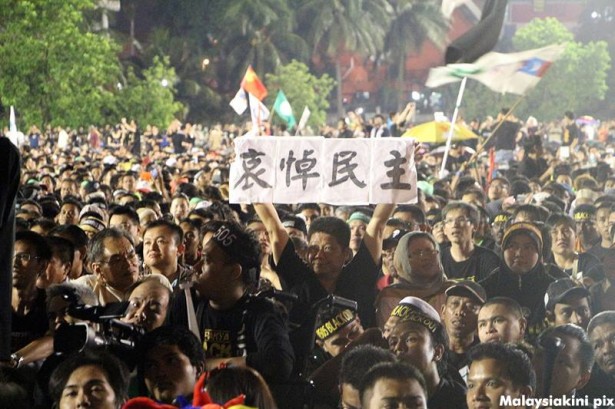
Less than a year after Malaysia’s Prime Minister Najib Razak announced that he would repeal the country’s Sedition Act — a law that curbs free speech — the state is using it to arrest and charge members and supporters of the opposition.
Still, this is doing little to deter activists, opposition supporters and citizens who continue to turn up in droves to protest against electoral fraud. Nine rallies — part of a series known as Blackout 505 — have already been organized, the last one having gone ahead on May 25 despite a government clampdown.
Malaysia’s political activists have been out in full force since the general election in early May. Amidst accusations of gerrymandering, the incumbent coalition Barisan Nasional held on to power despite having lost the popular vote. The result disappointed many who had hoped that this election would finally bring a change in government after 58 years of Barisan Nasional rule. Demonstrations erupted across the country as Malaysians protested over reports of electoral fraud and irregularities.
“It is clear that to have a clean and fair election process in the near future would be an uphill task after witnessing the amount of irregularities happening in certain states,” said first-time voter Adrian Phung. “[The election] made me realize that the general public is willing to go all out to ensure that the election process is clean and fair.”
This was the focus of a forum on May 13. The slogan “Selamatkan Demokrasi,” or “Save Democracy” in Bahasa Malaysia, called for people to stand up for democratic processes in Malaysia, and the event featured a long list of speeches from opposition members and pro-democracy activists.
It was one in a series of events criticizing the government, but this forum led to serious consequences. Two leaders from the opposition coalition Pakatan Rakyat, Tian Chua and Thamrin Ghaffar, were arrested. Also arrested were activists Haris Ibrahim and Adam Adli.
“Adam Adli was charged under Section 4(1)(b) of the Sedition Act for allegedly uttering a seditious statement at a public forum where he called for Malaysians to go to the streets to protest against the election fraud,” said his lawyer Fadiah Nadwa Fikri. If found guilty, he could find himself in jail for at least three years, and/or fined up to RM5,000 (approx. $1,648).
The use of the Sedition Act against Adam angered Malaysians, some of whom began to gather nightly outside the Jinjang Remand Center to hold candlelight vigils calling for his release. The day before Adam was due to be charged in court, the police moved in and arrested 18 people.
“We were given 10 minutes to finish our speeches and leave. However, as I recall, the police didn’t seem to keep their word and came after us before the 10 minutes,” said Adrian Wong, who was at the vigil that night. “The police shouted and caught people who refused to leave or were leaving slowly.”
Activist Peter Chong was one of those arrested. “The people were pushed away from the main gate of the detention center,” he said. “I was arrested about 30 minutes after the crowd had been dispersed. I stood in front of a restaurant and tried to stop a team of seven to eight officers from entering the premises to detain people.” According to Chong, one of the others arrested was a 15-year-old girl.
Such action has been widely seen as a move by the government to clamp down on opposition after the controversy of the election, but protesters aren’t backing down. The ninth Blackout 505 rally went ahead on May 26, with tens of thousands in attendance.
Organized by a coalition of over 50 non-governmental organizations, advocacy and political groups in Malaysia, the rally called for the current election commission to be replaced by a new team, appointed by a public hearing.
“The rally also calls for re-election in places where there are substantiated reports of electoral fraud irrespective of the results,” said Chong. “The rally supports Bersih’s [call for the] set-up of a people’s tribunal to investigate the fraud.”
The rally featured speeches from opposition leader Anwar Ibrahim, as well as the previously arrested Tian Chua and Haris Ibrahim. “Don’t think that these arrests will scare the people. We will not be cowed,” Chua was reported as saying in Malaysiakini, a news website.
The arrests also spurred Ambiga Sreenevasan, co-chairperson of the electoral campaign Bersih, to speak out, urging those with evidence of electoral fraud to approach the people’s tribunal they had set up.
Before the rally ended, promises were made that there would be more Blackout 505 events and demonstrations planned.
A few days after Saturday’s rally Tian Chua, Haris Ibrahim and Tamrin Ghafar were re-arrested under the Sedition Act, along with activists Safwan Anang and Hishamuddin Rais. They were charged in the Kuala Lumpur Sessions Court for sedition.
Yet it seems like no one has the intention of giving up. Tian Chua continued to tweet even as he was on his way to court, sharing information about his charge and retweeting the messages of support he received.
“Such harassment will not deter us from continuing the struggle, in fact more people will come out to support,” he said. “Blackout 505 will continue to mobilize the people for peacefully gatherings. For the next two months, we will organize a few more rallies around the country, including [in] Perlis, Kedah, Kelantan, Johor, Sabah and Sarawak.”
But rallies aren’t the only course of action. “We shall continue to put pressure whenever we can, through a variety of channels. We are also filing a few legal suits, although we won’t put much trust in our legal system,” he added. “I believe that the Najib government is rather weak and vulnerable. He cannot withstand both internal and external pressure for too long. Some sort of concession will have to be given.”
